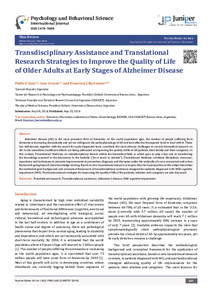Please use this identifier to cite or link to this item:
https://repositorio.uca.edu.ar/handle/123456789/14110| Título: | Transdisciplinary assistance and translational research strategies to improve the quality of life of older adults at early stages of alzheimer disease | Autor: | Sanz, Pablo Grasso, Lina Barrantes, Francisco José |
Palabras clave: | ENFERMEDAD DE ALZHEIMER; BIOMEDICINA; MEDICINA TRASLACIONAL | Fecha de publicación: | 2018 | Editorial: | Juniper Publishers | Cita: | Sanz, P., Grasso L., Barrantes, F.J. Transdisciplinary assistance and translational research strategies to improve the quality of life of older adults at early stages of alzheimer disease [en línea]. Psychology & Behavioral Science. 2018, 9(2): 555758. doi:10.19080/PBSIJ.2018.09.555758 Disponible en: https://repositorio.uca.edu.ar/handle/123456789/14110 | Resumen: | Abstract: Alzheimer disease (AD) is the most prevalent form of dementia. As the world population ages, the number of people suffering from dementia is increasing dramatically and yet we still ignore the pathophysiology of AD and lack effective therapeutic tools to deal with it. These two deficiencies, together with the search for early diagnostic tools, constitute the most obvious challenges in current biomedical research on AD. In the meantime, healthcare efforts are being addressed at improving the quality of life of AD patients, their family and their caregivers. In this context, Translational Medicine, an interdisciplinary branch within the biomedical field, is called upon to play a key role in transferring the knowledge acquired in the laboratory to the bedside (“from bench to bedside”). Translational Medicine combines disciplines, resources, experience and techniques to promote improvements in prevention, diagnosis and therapies under the umbrella of a new conceptual and action framework going beyond mere knowledge sharing. Based on new translational research concepts, this short perspective on the subject describes the methodological background and conceptual framework of transdisciplinary assistance designed for patients diagnosed with Mild cognitive impairment (MCI). Psychoeducational strategies for improving the quality of life of the patients, relatives and caregivers are also discussed. | URI: | https://repositorio.uca.edu.ar/handle/123456789/14110 | ISSN: | 2474-7688 | Disciplina: | MEDICINA | DOI: | 10.19080/PBSIJ.2018.09.555758 | Derechos: | Acceso abierto | Fuente: | Psychology & Behavioral Science. 2018, 9(2): 555758 |
| Appears in Collections: | Artículos |
Files in This Item:
| File | Description | Size | Format | |
|---|---|---|---|---|
| transdisciplinary-assistance-translational.pdf | 326,93 kB | Adobe PDF |  View/Open |
Page view(s)
47
checked on Apr 27, 2024
Download(s)
35
checked on Apr 27, 2024
Google ScholarTM
Check
Altmetric
Altmetric
This item is licensed under a Creative Commons License

